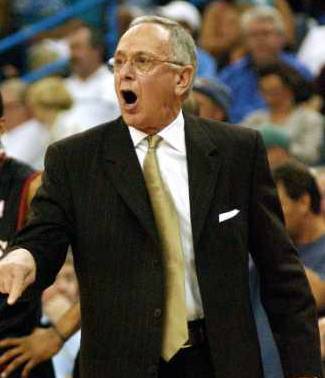
Larry Brown
(1940 - )
A University of North Carolina basketball star from 1961 to 1963, Larry Brown won an Olympic gold medal in 1964 as a member of the champion United States basketball team.
Named to the 1963 All-Atlantic Coast Conference team and drafted by Baltimore of the National Basketball Association (NBA), Brown opted to play for Goodyear's (Akron, Ohio) Amateur Athletic Union team, winning the Most Valuable Player Award in the 1964 AAU Tournament.
Brown played five seasons in the American Basketball Association (ABA)—three times an All-Star guard—with New Orleans, Oakland, Washington, Virginia, and Denver, averaging 11.3 points per game. He led the ABA in assists and had been the All Star Game Most Valuable Player as a point guard for the Oakland Oaks.
Brown turned to coaching in 1972, winning the ABA championship with season winning the ABA the Carolina Cougars in his first season. He won his second ABA crown at the helm of the Denver Nuggets in 1974-75 and was named the League's Coach of the Year. The Brown-led Nuggets won their division title in 1975-76 (final season of the ABA). He continued as coach of the Denver franchise when it joined the NBA for the 1976-77 season, winning two division titles in three seasons. At the beginning of February during the 1978-79 season, Brown resigned as Broncos coach.
Less than two months later, he accepted the head coaching position at the University of California at Los Angeles (UCLA). In his first season, Brown led the Bruins to the National Collegiate Athletic Association's (NCAA) Final Four, losing to Louisville in the 1980 championship game. His nationally third-ranked UCLA team again qualified for the NCAA Tournament the following year, but enjoyed less success, prompting him to resign.
Later that year, Brown was back coaching in the NBA, taking over the head coaching job of the New Jersey Nets. The Nets were an Eastern Division last-place team before Brown took the helm, but he led them to the playoffs in his first full season, as well as the following year. Under Brown, the Nets were 91-69 from 1981 to 1983, but he opted to sign on for the top coaching job at the University of Kansas for the season to follow.
Between 1984 and 1988, the Brown-led Kansas Jayhawks enjoyed a 129-44 record and captured the NCAA Tournament Championship in 1988, American college basketball's top prize.
But, Brown decided to return to the NBA, and from 1988 to 1992, he coached the San Antonio Spurs to the playoffs the latter two of three full seasons. Nonetheless, holding a 21-17 win-loss record, he left the Spurs 38 games into the 1991-92 season (his fourth) and took over the Los Angeles Clippers with 35 games left in the same season. The Brown-directed Clippers finished the NBA season with 23 wins and 12 losses and did something the franchise had not done for years' they made the playoffs. Again, the following season, the Los Angeles team made the playoffs, this time with a 41-41 win-loss record. However, at season's end, with two years left on his contract, Brown resigned as Clipers coach.
In 1993, he took over as head coach of the NBA's Indiana Pacers, enjoying three consecutive winning seasons that took them to the playoffs three times and to the Eastern Conference finals twice. After the Pacers finished a subpar 39-43 in 1996-97, Brown left Indiana and emerged in Philadelphia as the NBA 76ers' head coach and vice president of basketball operations.
Brown led the 76ers for six seasons, coaching them to the NBA playoffs five consecutive years (1997–2002). He coached Philadelphia into the NBA finals in 2001, and was named NBA Coach of the Year. The following season, his last in Philadelphia, Brown was elected to the Naismith Memorial Basketball Hall of Fame.
When the NBA’s 2003-04 season launched, Larry Brown was now at the helm of the Central Division’s Detroit Pistons, the same NBA franchise coached by brother Herb Brown from 1975 to 1978. Big brother Larry promptly accomplished the improbable––he coached his underdog Pistons to the NBA championship over the highly favored Los Angeles Lakers. By leading the Pistons to the playoffs, Brown became the first coach in NBA history to guide seven franchises into the annual post season competition.
Coach Brown’s teams (pro and college combined) have posted a winning record in 27 of 31 seasons. In 20 NBA seasons, he has compiled a 933-713 regular season won-loss record, plus 85-79 post season, ranking him seventh all-time in victories, and fourth among active coaches (at publication).
In preparation for the 2004 Olympic Games, Brown was appointed head coach of the USA Men’s Senior Basketball Team, leading it to victory at the 2003 FIBA Americas Olympic Qualifying Tournament in Puerto Rico. In the summer of 2004, he coached the U.S. Olympic Team to a bronze medal at the Games in Athens.
Inasmuch as he is still an active coach, Larry Brown's coaching record is incomplete. Brown was a member of the 1961 United States gold medal Maccabiah basketball team.
Courtesy of:
